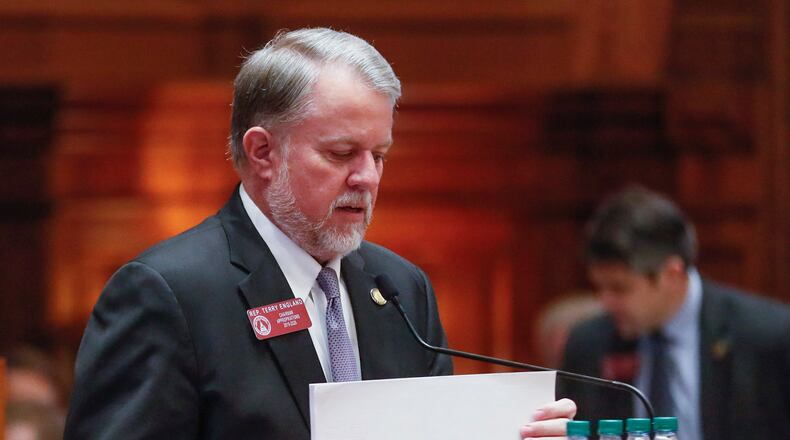The Georgia House and Senate gave final approval Thursday to one of the most important bills of the legislative session so far: the mid-year budget to keep state government running through June 30.
The chambers sent the budget to Gov. Brian Kemp for his signature a few hours before legislative leaders announced they’d suspend the 2020 session because of the coronavirus pandemic.
It’s unclear what impact a possible economic slowdown caused by the pandemic - likely meaning temporarily lower tax collections - will have on the new budget. It is built on a certain level of revenue growth that may not occur in the final four months of the fiscal year.
The state is required by its constitution to have a balanced budget.
The mid-year plan includes $100 million Kemp requested Wednesday to help the state deal with coronavirus.
Kemp said the $100 million would go to assist the Georgia Emergency Management Agency and the Department of Public Health in their response efforts.
The governor took the unusual step of shifting the money from the state’s reserves, which are typically used only in the case of a fiscal emergency. The last time a governor used such reserves were in the aftermath of the Great Recession.
“Widespread occurrence of this virus is a serious threat to our health systems, our vulnerable citizens, and the economic engine of our state,” Kemp said in a letter to House Speaker David Ralston, R-Blue Ridge, and Lt. Gov. Geoff Duncan.
House Appropriations Chairman Terry England, R-Auburn, told colleagues, "The revenue shortfall reserve is there for things like this. This is something none of us saw coming."
Lawmakers also added $5 million into the midyear budget for hospitals, which they said may face special costs associated with the virus. Georgia officials have already reported coronavirus cases in rural Georgia.
Rep. Scott Holcomb, D-Atlanta, questioned whether the state should adjust its assumptions about revenue collections since they may be impacted by coronavirus’ disruptions to the economy. Less money coming in could throw the budget out of balance.
But England said that impact should be short-term and that there should be “a fairly robust” economy after the threat fades or slows.
The mid-year plan started largely as an opportunity for the House and Senate to vent over Kemp’s recommendations to slash state spending.
Lawmakers pushed back on many of the spending cuts Kemp proposed that would make an impact on small-town Georgia, a key constituency in both chambers, which are largely run by legislators from outside metro Atlanta.
Kemp ordered state agencies in August to prepare plans for 4% budget cuts this fiscal year and 6% next year to both respond to slow tax collections last year and provide enough money for the governor's priorities, including a $2,000 teacher pay raise and his effort to attack gangs. The House voted Tuesday to reduce that raise to $1,000 as part of the budget for fiscal 2021, which begins July 1.
About three-fourths of the budget — money that goes to k-12 schools, colleges, the health program Medicaid and transportation — was exempted from reductions.
The midyear budget would still cut $159 million in spending and leave 1,255 vacant positions unfilled, but the House and Senate rearranged how reductions would be made.
Kemp’s proposal to eliminate vacant state positions was controversial, with lawmakers saying some of them — including crime lab scientists and guards in the juvenile justice system — need to be filled. The House and Senate agreed to restore funding for some of the positions, including public defenders, lab workers and Department of Agriculture food safety inspectors.
Both chambers said no to Kemp’s cuts in funding for preparing doctors at the Morehouse School of Medicine and Mercer University’s medical school, and to his proposed reduction to the Rural Health Systems Innovation Center at Mercer, a project lawmakers started a few years ago to help improve health care in rural Georgia.
They also reduced cuts that Kemp proposed for mental health programs and eliminated reductions for local library materials, and they pushed back on Kemp’s proposal to cut $6.3 million in grants to county public health departments.
They criticized the cuts to public health programs even before the coronovirus came to Georgia, saying county departments were especially important for health care in rural Georgia.
About the Author
Keep Reading
The Latest
Featured





